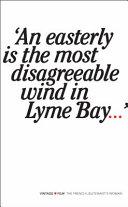Works
Famous John Fowles Quotes
“I'm not really sorry. But I'm not absolutely unsorry.”
Source: The Collector
“I knew I would always want to go on living with myself, however hollow I became, however diseased.”
Daniel Martin (1977)
Source: The Magus
Context: I saw that I was from now on, for ever, contemptible. I had been and remained, intensely depressed, but I had also been, and always would be, intensely false; in existentialist terms, inauthentic. I knew I would never kill myself, I knew I would always want to go on living with myself, however hollow I became, however diseased.
John Fowles Quotes about love
John Fowles: Trending quotes
“We all write poems; it is simply that poets are the ones who write in words.”
Source: The French Lieutenant's Woman
John Fowles Quotes
“When you draw something it lives and when you photograph it it dies”
Source: The Collector
“There is only one good definition of God: the freedom that allows other freedoms to exist.”
Source: The French Lieutenant's Woman (1969), Ch. 13, p. 99
“But forgetting's not something you do, it happens to you. Only it didn't happen to me”
Variant: Forgetting’s not something you do, it happens to you. Only it didn’t happen to me.
Source: The Collector
The Aristos (1964)
Context: The artefacts of a genius are distinguished by rich human content, for which he forges new images and new techniques, creates new styles. He sees himself as a unique eruption in the desert of the banal. He feels himself mysteriously inspired or possessed. The craftsman, on the other hand, is content to use the traditional materials and techniques. The more self-possessed he is, the better craftsman he will be. What pleases him is skill of execution. He is very concerned with his contemporary success, his market value. If a certain kind of political commitment is fashionable, he may be committed; but out of fashion, not conviction. The genius, of course, is largely indifferent to contemporary success; and his commitment to his ideals, both artistic and political, is profoundly, Byronically, indifferent to their contemporary popularity. <!-- no. 61
“I know what I am to him. A butterfly he has always wanted to catch.”
The Collector (1963)
Context: I know what I am to him. A butterfly he has always wanted to catch. I remember (the very first time I met him) G. P. saying that collectors were the worst animals of all. He meant art collectors, of course. I didn’t really understand, I thought he was just trying to shock Caroline — and me. But of course, he is right. They’re anti-life, anti-art, anti-everything.
The Aristos (1964)
Context: The artefacts of a genius are distinguished by rich human content, for which he forges new images and new techniques, creates new styles. He sees himself as a unique eruption in the desert of the banal. He feels himself mysteriously inspired or possessed. The craftsman, on the other hand, is content to use the traditional materials and techniques. The more self-possessed he is, the better craftsman he will be. What pleases him is skill of execution. He is very concerned with his contemporary success, his market value. If a certain kind of political commitment is fashionable, he may be committed; but out of fashion, not conviction. The genius, of course, is largely indifferent to contemporary success; and his commitment to his ideals, both artistic and political, is profoundly, Byronically, indifferent to their contemporary popularity. <!-- no. 61
The Collector (1963)
Context: I don’t think the Campaign for Nuclear Disarmament has much chance of actually affecting the government. It’s one of the first things you have to face up to. But we do it to keep our self-respect to show to ourselves, each one to himself or herself, that we care. And to let other people, all the lazy, sulky, hopeless ones like you, know that someone cares. We’re trying to shame you into thinking about it, about acting.
Source: The Collector
“We all want things we can't have. Being a decent human being is accepting that.”
Source: The Collector
“I am infinitely strange to myself.”
Source: Charles to Sarah in Ch. 47, p. 340 note: The French Lieutenant's Woman (1969)
Source: The Collector
“It is only when our characters and events begin to disobey us that they begin to live.”
Source: The French Lieutenant's Woman
“The ordinary man is the curse of civilization.”
Source: The Collector
“If anything might hurt her, silence would; and I wanted to hurt her.”
Source: The Magus
“They're beautiful. But sad.'
Everything's sad if you make it so, I said.”
Source: The Collector
“We are all in flight from the real reality. That is the basic definition of Homo Sapiens.”
Source: The French Lieutenant's Woman
“Wolves don't hunt singly, but always in pairs. The lone wolf was a myth.”
Source: The Magus
Source: The Magus
“I mean I never feel I feel what I ought to feel.”
Source: The Collector
Source: The Magus
“The best wines take the longest to mature.”
Source: The French Lieutenant's Woman
Source: The Collector
“Duty largely consists of pretending that the trivial is critical.”
Source: The Magus (1965), Ch. 18
Daniel Martin (1977)




